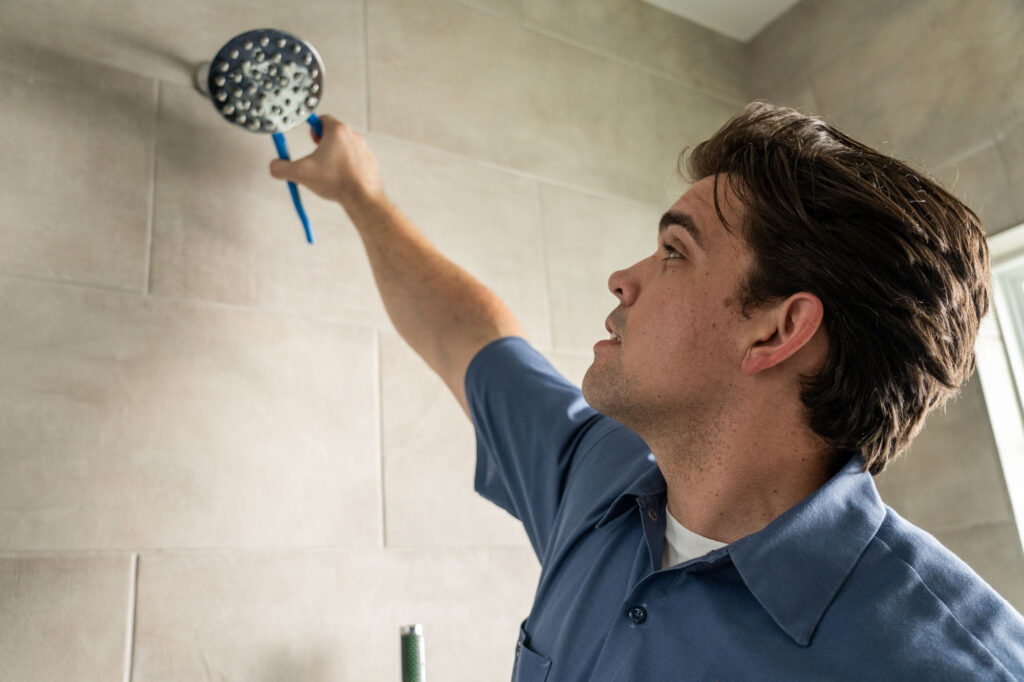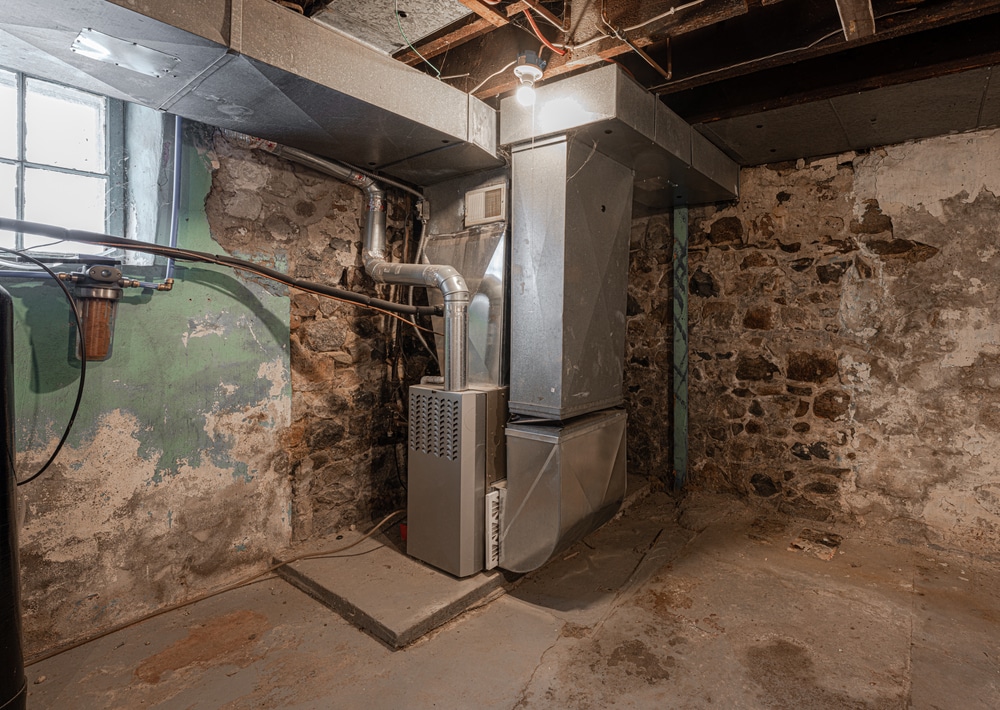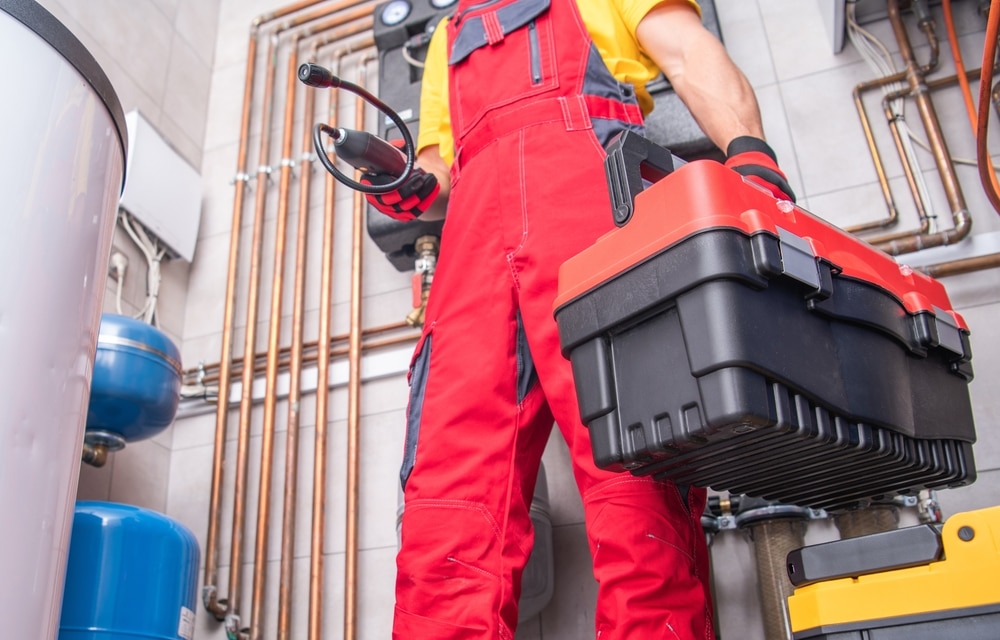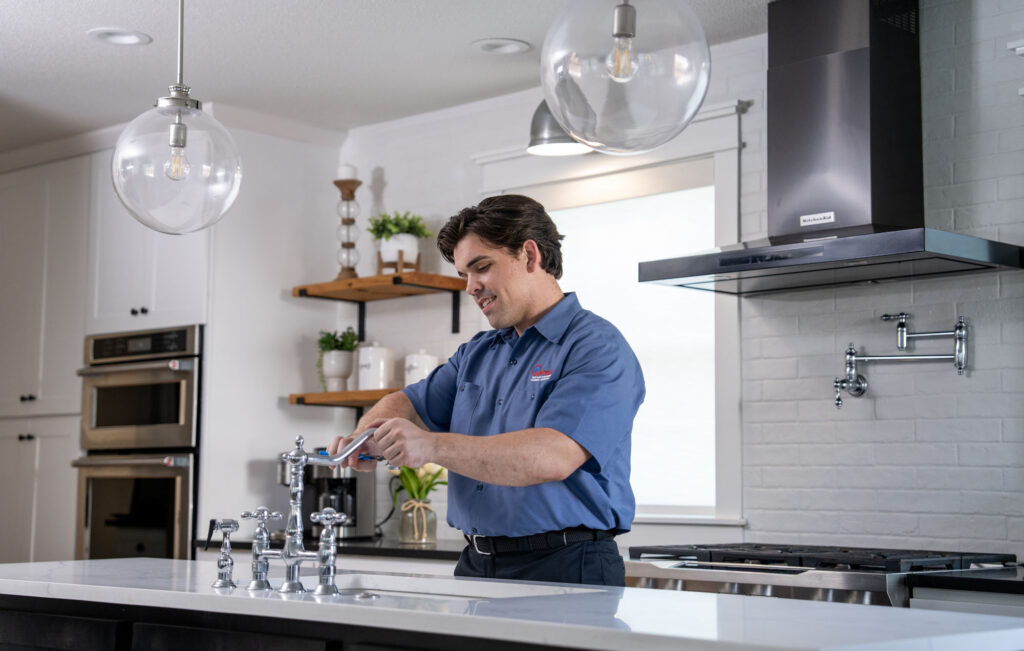Blog
Why Is My Water Pressure So High?

High water pressure might feel like a luxury, especially during a hot shower, but it could be quietly damaging your home and driving up your water bill.
Residential plumbing systems are designed to support a certain amount of water pressure safely. When that pressure stays too high for too long, it can lead to serious and costly issues, such as leaks and strain on your water heater.
If you’ve found yourself wondering, “Why is my water pressure so high all of a sudden?” this guide is for you. We’ll walk you through the most common reasons behind high water pressure in houses. You’ll also learn how to maintain healthy water pressure levels to protect your plumbing and appliances, without sacrificing comfort.
Understanding Water Pressure
In most residential areas, water is supplied by a municipal water provider. After being pumped to treatment facilities, it’s stored in elevated pressure tanks that distribute water throughout the city or community. The water pressure is created by the height of these tanks, combined with the weight of the water that fills them.
Water pressure is measured by pounds per square inch (PSI). For homes, normal water pressure ranges from 40 to 80 PSI. Any pressure above 80 PSI is considered high water pressure in your house, which poses an increased risk of damage to pipes, joints, and fixtures.
While high water pressure may seem convenient in the short term, it can lead to significant water waste and increased costs over time.
Common Causes of High Water Pressure in a House
Identifying high water pressure in your home can be as simple as noticing a strong flow while hosing your garden or washing your car. Although this might seem great for getting chores done, it can quickly lead to costly and harmful effects.
Look out for the following common causes of high pressure related to municipal regulations, home location, or faulty system components:
- Sudden changes in water supply pressure: If your local water supply facility adjusts tank size, water weight, or distribution methods, it can alter the water pressure you receive, leading to unexpected spikes in PSI levels.
- A faulty pressure-reducing valve (PRV): A PRV regulates household water pressure and typically lasts 7 to 10 years. If yours is aging or frequently needs repairs, it may need to be replaced to prevent high water pressure levels in the house.
- Thermal expansion: When water is heated, it expands, increasing system pressure. This is especially problematic if your water heater is malfunctioning and overheating water beyond safe limits.
- Home location: Is your home set at the top of a hill? Water pressure is typically intentionally raised for homes situated on hills or elevated points to distribute appropriate levels effectively at all locations. These homes usually have a pressure regulator to protect their systems.
- Seasonal or neighborhood-related fluctuations: Municipal systems may temporarily increase water pressure during certain seasons or to meet specific neighborhood demands, contributing to noticeable changes in water pressure levels.
Signs and Risks of Excessive Water Pressure
If you’ve recently enjoyed longer or more powerful showers, easily rinsing every bit of shampoo from your hair, the refreshing water pressure could be a sign of a bigger problem. While high water pressure might make your showers feel more efficient, it can lead to increased water bills and long-term damage to your plumbing system.
To save yourself from unexpected costs and the headache of wondering why your water pressure is so high all of a sudden, look for these warning signs and their associated risks:
- Noisy plumbing or “banging” pipes: If you hear strange noises such as banging or clanging after flushing the toilet or shutting off the faucet, this could be a sign that pressure is too high. Without proper attention from a plumber, the pressure will lead to severe leaks and water damage to your home.
- Frequent leaks or damaged fixtures: An occasional leaky faucet can be quickly repaired. However, if they continue to drip even after they’ve been replaced, you could have high pressure levels that can lead to severe leaks, resulting in damage, a high water bill, and repair costs.
- Shortened lifespan of water appliances: Frequent issues with your water appliances, such as the washing machine, water heater, or dishwasher, may be a sign of high water pressure in your system. Contact a professional plumber to avoid further disruption in appliance efficiency and longevity.
- Increased water bills: Small fluctuations in your water bill are normal. However, if your bill has significantly jumped in cost, you could be using more water than you think due to increased pressure.
If you notice any of these signs, contact your local trusted plumbers at Suntech for professional and quick solutions to restore proper pressure levels.
How to Check Your Home's Water Pressure
If you suspect high water pressure in your house, the culprit is likely hiding somewhere within the home. From a toilet leak to a malfunctioning water heater, these common plumbing issues can be signs of strained water pressure, and a pressure check can help determine whether it’s time to call in a professional.
While in-home causes are common, begin by ruling out a potential municipal issue with your local water supply through a process of elimination. Confirm whether all appliances in your home are experiencing high pressure, and check if your neighbors are having similar problems. If the answer is no, it’s time to test your water PSI levels:
- Purchase a water pressure gauge to accurately read the PSI levels.
- Locate your water spigot, or outdoor faucet, typically near the front or side of your home.
- Remove the hose and screw on the test gauge to the spigot. Make sure the face of the gauge is visible so you can read the pressure level.
- Now, turn the spigot valve on and check for the pressure reading. This number will tell you the amount of pressure coming into your home’s water supply.
- Make sure you document the reading for future reference if you ever suspect water pressure issues.
While testing your water pressure levels at home is relatively straightforward, contact a professional plumber immediately if the pressure drops or increases by more than 3 PSI. The expert plumbers at Suntech will conduct professional water pressure testing to resolve a potentially serious leak and protect your home.
How to Fix High Water Pressure in a House
If your sinks blast water when you turn on or your pipes make obnoxious banging noises, you might be dealing with water pressure. Luckily, when seeking how to fix high water pressure in your house, there are a few simple ways to get things under control.
To return your water pressure to its optimal levels, a water pressure regulator or thermal expansion tank will be your right-hand:
- Pressure-Reducing Valve (PRV): This is usually located near where the water line enters your home. If it’s already installed, it might just need adjusting. If not, invest in a professional installation to keep water pressure levels regulated and avoid dangerously high levels.
- Thermal expansion tank: Best for homes with closed plumbing systems, as they give heated water room to expand, which keeps pressure levels safe. If your home relies on a thermal expansion tank, don't forget to monitor your pressure regularly with a gauge.
While these steps are effective in keeping pressure at bay, schedule a professional inspection regularly to prevent major plumbing problems down the line and sustain your peace of mind.
When to Contact a Professional
While DIY solutions might be quick fixes, they won’t protect you in the long term, especially if your rise in water pressure stems from a deeper issue.
If you suspect high water pressure in your house, it’s smart to bring in a professional right away. A licensed plumber can accurately test your system, pinpoint the source, and recommend solutions that last.
The trained professionals at Suntech have the experience and tools to spot the warning signs most homeowners miss.
From faulty pressure-reducing valves to hidden thermal expansion problems, we catch small issues before they turn into expensive damage. Our comprehensive plumbing repair services address any of your pressure concerns. From drain cleaning to emergency plumbing solutions, we restore your comfort and safety quickly and carefully.
Conclusion
Wondering why your water pressure is so high all of a sudden? Being caught off guard by a sudden rise in water pressure can be overwhelming, not to mention inconvenient and potentially unsafe.
High water pressure may seem like a minor issue at first, but over time, it can lead to damaged appliances, leaking pipes, and costly repairs. The best way to avoid this? Stay proactive. Regular maintenance, pressure monitoring, and timely service are your first line of defense against long-term damage.
Not all issues are visible, and that’s where expert help matters. A professional assessment can catch early warning signs and protect your home before problems escalate.
Whether it’s a faulty pressure-reducing valve, thermal expansion, or municipal fluctuations, understanding the root cause is key, and Suntech is here to help with expert residential and commercial plumbing services.




